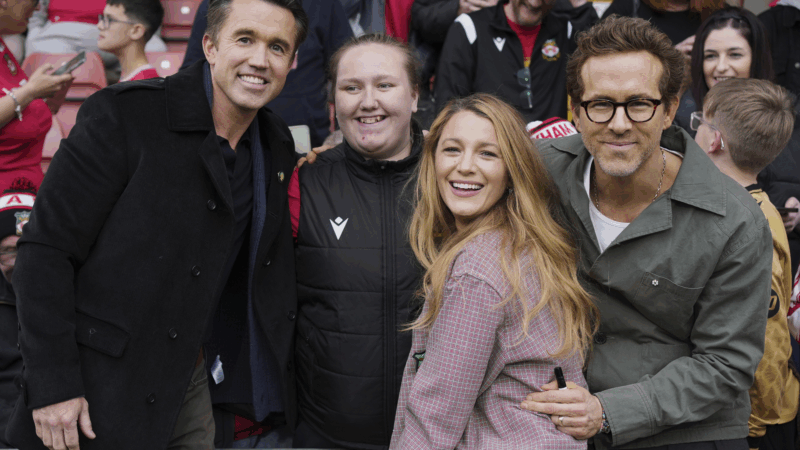Why are so many rich Americans investing in British soccer teams?
Nestled on Britain’s south coast in the county of Dorset, Bournemouth is a quintessential English seaside town, known for its sandy beach and fish and chips. At the start of October, Bournemouth men’s soccer team hosted Fulham, London’s oldest professional soccer team, for a tightly contested Premier League match.
But although these two soccer teams might seem entirely English, they are both actually owned by Americans. And they are not alone: teams like Liverpool, Chelsea, and Manchester United, who have fans around the world, also now all have American owners. In fact, more than half of the 92 teams in the top four leagues in England and Wales have some American ownership, while Americans are also investing in teams in Scotland and across Europe.
“It’s a much more affordable option into a high level of major sport,” explains Jim Frevola, Bournemouth’s president of business operations. Frevola moved from America to Bournemouth three years ago to help run the franchise for billionaire owner Bill Foley.
Frevola compares the prices of British soccer teams to franchises in sports like the NFL and NBA in America. “Teams are going for six, eight billion … where you could buy teams in the Premier League for a much more affordable opportunity,” Frevola said. “And, it’s the best league in the world of the best sport in the world.”
Since moving to Bournemouth, Frevola has been struck by the passion of English soccer fans. “I never thought sports was different… until I came over here,” Frevola said. “It wasn’t until two, three months of living here did I realize that this is their life … this is what people live and breathe for. That’s special. That’s unique.”

Health care and real estate investor Kevin Nagle is the owner of Huddersfield, a third-tier team in Yorkshire, which he bought two years ago. “I guess instead of saying the British are coming, we say the Americans are coming,” Nagle joked. “I purchased it outright in a really short period of time, sight unseen,” he added. “It wasn’t until after the fact that I came to Huddersfield to see what it was like. And I was very, very happy.”
Nagle also owns a soccer team in California, Sacramento Republic. But like Jim Frevola, he says there’s something special about the richness of British soccer history. “It’s just amazing when we see a lot of our fans, because their great, great, great-grandparents were watching the team play,” Nagle says. “Do we love our soccer in the U.S.? Yes. But do we have the traditions in the U.K.? Absolutely not.”
The involvement of several U.S. celebrities has brought extra attention to British soccer teams. Actor Will Ferrell has invested in Leeds, rapper Snoop Dogg in Swansea, and basketball star LeBron James in Liverpool. Similarly, actor Michael B. Jordan has a stake in Bournemouth.
Some of the stars have made documentaries about their teams. First, Hollywood star Ryan Reynolds — who was born in Canada — and his fellow actor and producer Rob McElhenney made the documentary Welcome to Wrexham about their journey buying the Welsh franchise Wrexham, which is now in its fourth season. This year, ex-NFL player Tom Brady joined them with his documentary Built in Birmingham, about becoming co-owner of Birmingham City Football Club.

TV fiction has also boosted American interest in British soccer, particularly the successful TV dramedy Ted Lasso, about an American college football coach who is hired to manage a London soccer team. Starring Jason Sudeikis and Brett Goldstein, the show — which has won multiple Emmys — is set to release its fourth season next year.
Christina Philippou, an associate professor in accounting and sport finance at the University of Portsmouth, said the celebrity involvement in many of the franchises can be attention-grabbing, it usually takes the form of a minority stake. “They are able to effectively use their status to enhance the image of the club and help bring in more external income particularly around commercial partnerships,” Philippou said.
She explained that while English football has seen investment from Russia and the Gulf countries over the years, the new U.S. owners have made their teams more commercial, as well as boosting women’s football teams at many British franchises. “We’ve seen a little bit more investment in women’s football within club level … part of [that] is American money because traditionally they’ve been more interested in women’s football.”
In the U.S., British soccer has a growing audience, with as many as 40 million fans, with many watching on CBS, says Ben Wright, chief commercial officer for the English Football League — which covers both England and Wales. Wright said interest in soccer in America grew noticeably during the pandemic. “It felt like … because people couldn’t go out and about globally, they were watching a lot more,” Wright said.
Meanwhile, Lionel Messi, the Argentinian who many consider the greatest soccer player of all time, plays for the American Major League Soccer team Inter Miami. On top of that, next summer’s World Cup is being held jointly by the USA, Canada and Mexico, which experts hope will only grow the sport.

Some soccer fans back in Britain fear that American owners might want to make changes to their league, such as playing league games in the USA. But Bournemouth’s business manager Jim Frevola says that although he is aiming to grow his team’s fan base back in the USA, there are no plans for major overhauls. “I think there’s maybe a misconception that American ownership wants to institute [big changes],” Frevola said. “I’ve heard crazy things like all-star games. That’s never going to happen.”
In a pub near Bournemouth’s Vitality Stadium, most fans are in favor of their American owner Bill Foley. Supporter Ceri Morgan said that although the slightly increased ticket prices have been a drawback, the investment is clear to see. “The stadium looks a lot smarter now and we’re getting an increased capacity next season,” he said. His fellow life-long fan Dom Webb agreed. “It’s been incredible. … We’ve got really solid foundations now, and it feels like the sky’s the limit,” he said.
Pentagon shifts toward maintaining ties to Scouting
Months after NPR reported on the Pentagon's efforts to sever ties with Scouting America, efforts to maintain the partnership have new momentum
Why farmers in California are backing a giant solar farm
Many farmers have had to fallow land as a state law comes into effect limiting their access to water. There's now a push to develop some of that land… into solar farms.
Tariffs cost American shoppers. They’re unlikely to get that money back
After the Supreme Court declared the emergency tariffs illegal, the refund process will be messy and will go to businesses first.
Every business wants your review. What’s with the feedback frenzy?
Customers want to read reviews and businesses need reviews to attract customers. But the constant demand for reviews could be creating a feedback backlash, experts say.
Civil rights leaders say the racial progress Jesse Jackson fought for is under threat
Activists say racial progress won by the Rev. Jesse Jackson is under threat, as a new generation of leaders works to preserve hard-fought civil rights gains.
‘Get back to integrity’: Oklahoma’s Kevin Stitt on Republicans after Trump
NPR's Steve Inskeep asks Oklahoma Gov. Kevin Stitt about his spat with President Trump, immigration and the future of the Republican Party.






